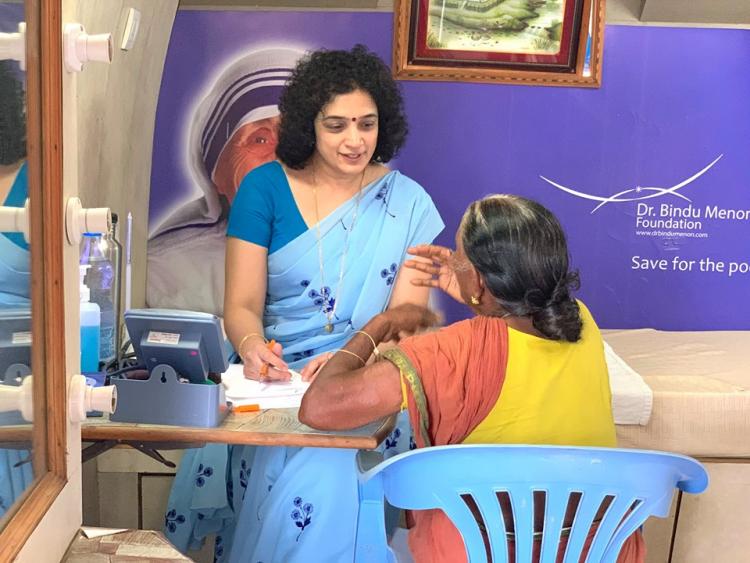
‘Neurology on Wheels’: This doctor is taking her services to the villages for free
 On the week-days, Dr Bindu Menon is a doctor at a hospital in Nellore. On the weekends, she navigates through the narrow lanes of villages of the Andra Pradesh in a small van. The only difference is that she is not going on a leisure trip, but for something more.
On the week-days, Dr Bindu Menon is a doctor at a hospital in Nellore. On the weekends, she navigates through the narrow lanes of villages of the Andra Pradesh in a small van. The only difference is that she is not going on a leisure trip, but for something more.
Holding the grip on the motto, ‘We reach, We teach and we treat’, Dr Bindu Menon has been taking the healthcare services to the most remote parts of the state.
In the past 4-years, the ‘Neurology on Wheels’ has covered 23 remote villages in Andhra Pradesh. Addressing the problem of lack of healthcare services in rural areas, Dr Bindu Menon started Dr Bindu Menon Foundation as a not for profit initiative, but as a service to reach poor patients in rural areas for whom even regular medicines are considered ‘luxury’.
The Birth of ‘Neurology on Wheels’
“My major area of focus was on patients suffering from epilepsy and strokes. While the rich sought immediate treatment, people belonging to weaker economic sections either were not aware of the severity of the disease or there was a gap in availing the right kind of treatment. For the same reason, I started the Dr Bindu Menon foundation 2013, intending to provide free medical treatment and check-ups to people suffering from epilepsy and strokes,” the doctor recalls.
However, it became clear that the foundation wasn’t reaching as many people as Dr Bindu wanted to. Patients started narrating stories of people back in their villages with similar diseases.
“I understood there was a treatment gap – people, especially the old, didn’t think it was important they treat themselves after a stroke or an epilepsy seizure. They often were made to think that they are doomed to live with it for the rest of their lives. From patients who visited me at the foundation, I realised only a very few out of the affected came forward to be treated and that’s how we conceived the idea of ‘neurology on wheels’,” she adds.
Started in 2015, ‘Neurology on Wheels’ is a first-time project in the country for providing specialized neurological services in the remotest parts. Armed with assistants from the Dr Bindu Menon foundation, the doctor spends almost a day in the village, usually Sunday, treating patients with epilepsy, strokes and other neurology-related diseases. The check-ups are free and she hasn’t had a break in this routine in the past four years.
The villages are randomly selected by the foundation before planning their visit. Later, the team visits the village with the village head to give intimidation about the camp in advance. After the awareness programme, a free medical camp is held where screening and detection of hypertension, diabetes and stroke are done. Later, the team distributes medicines for the needed.
The ‘good doctor’
Born and brought up in Bhopal, for Dr Bindu, neurology always seemed as fascinating as mathematics. “I was always amazed at the way brain functioned like a CPU for our body. The way we talk, laugh or cry – each action is intricately connected to the way our brain functions. Back in my day, when women mostly chose gynaecology as their subject, my heart was in studying neurology,” the neurologist says.
Dr Bindu worked as a neurologist in a couple of hospitals in Andhra while also starting the Neurology Department at the Tirupati medical college in 2008.
But, as nice it seems to be, travelling to the rural areas are not easy to arrange. “It isn’t an easy task to arrange the travel. First, we need to convince the village chief to let us hold the camp on a Sunday. Secondly, he needs to inform every villager about the camp and the kind of symptoms that they can be checked for. Our mission is to reach, teach and treat,” Dr Bindu says, adding, “It’s difficult to make people realise why they need to be treated. For example, instances of a disease like a cysticercosis, which is caused by tapeworms inside brains, can be effectively reduced by washing hands after ablutions or following simple practices like washing vegetables before cooking. And this is the reason we hold a 45-minute session before we start the check-up in each village.”
The minivan has been arranged in a way that a doctor and a patient can sit and conduct the preliminary examination.
They provide them with medicines for a month and if the condition is found to be one that needs immediate attention, they refer them to surgeons or even to doctors at the nearby PHCs.
Apart from these, Dr Bindu conducts awareness camps, even in schools and colleges. She has also launched an app and a toll-free number for epileptic patients which come as a huge relief for keeping a track of the ongoing treatment and solve the doubts regarding the same.
In what can be called as an ‘Epitome of service’, Dr Bindu and her team are now working on conducting follow-up treatment in villages, which according to Dr Bindu, requires a lot of resources and planning. And she says, at the end of the day, being a physician is all about serving the people!
Source: The News Minute, Logical Indian, The Better India